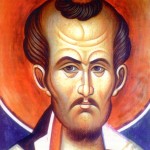by St. John Chrysostom

Our father among the saints, John, Archbishop of Constantinople, was an important Early Church Father. He is known for his eloquence in preaching and public speaking, his denunciation of abuse of authority by both ecclesiastical and political leaders, the Divine Liturgy of St. John Chrysostom, and his ascetic sensibilities. After his death (or, according to some sources, during his life) he was given the Greek surname chrysostomos, meaning “golden mouthed”, rendered in English as Chrysostom.
“What I am saying, I say to you also who minister, as well as to you who are ministered to. For it is necessary that I also address myself to you; that you may distribute the sacred gifts with great caution. For your punishment is not light should you, knowingly, admit anyone to the Communion of this Table whom you know to be unworthy of it. His blood will be required at thy hand (Ezek. 33: 8). And even though he were a general, or a governor, or even he who wears the crown, should he draw near unworthy, forbid him: for higher is your authority than his. For if a spring of pure water were placed in your care for your flock, and you saw a sheep coming, with its mouth smeared with mud, you would not let it put down its mouth to dirty the well. Now you have been given charge of a well, not of water, but of Blood and the Spirit; and should you see some one draw near who is soiled with sin, a more grievous thing than clay or mud, and you are not moved to wrath, and you do not drive him away, how do you deserve to be forgiven? It was for this God honoured you with this dignity: that you might exercise judgement in these things. This is your office; this is your own security; this is your whole crown: not that you may go about clothed in a shining white habit.
And how, you may ask me, can I know about this person or that person? I am not speaking of those you do not know, but of those you to know. And shall I say something more serious? It is not as dreadful to be possessed by evil spirits such as those of whom Paul speaks as to tread Christ under foot, and to hold the blood of the testament unclean, and offer an affront to the Spirit of grace (Heb. x. 29). He who has sinned, and comes to Holy Communion, is lower than one possessed by a demon. For those who are afflicted by an evil spirit are not on that account punished. But these others should they come, unworthy, to the altar, they are handed over to everlasting punishment.
Let us drive away not these only but all without exception whom we see draw near who are unworthy. Let no Judas receive, lest he suffer as Judas did. This Gathering is also the Body of Christ. Watch therefore, you who fulfil the office of deacon in these Sacred Mysteries, that you do not provoke the anger of the Lord by not purifying His Body: that you do not give a sword in place of food. And though such a one should approach the altar out of ignorance, exclude him, and be unafraid. Be in fear of God, not of man. For if you fear a man, you will be laughed at, even by him. But if you fear God, you will have the respect of men. Yet, if you do not dare to do this, then bring them to me. I shall not suffer that this be even attempted. I would lay down my life first, before I would present the Lord’s Blood to one who was unworthy of It; and pour out my own blood rather than give this Fearful Blood contrary to what is fitting.
But if you do not know who is unworthy, though exercising much care, then there is no fault on your part. For what I am saying is about those who are well known. If we correct those, God will soon disclose those we do not know. But if we do not disturb those who are known to be unworthy, why should God make the others known to us? I say these things to you, not to drive these away, not simply to cut them off, but that we may lead them to do what is right, that we may take care of them. For by doing this God will be gracious to us, and we shall find many who will then receive worthily. And for our own zeal, and because of our care for the souls of others, our reward shall be very great. And to this may we all attain, by the grace and mercy of our Lord Jesus Christ, to Whom be honour and glory for ever and ever. Amen.”
(P.G. 58, Hom. 82-3,par. 4, On Matthew, col. 743).
